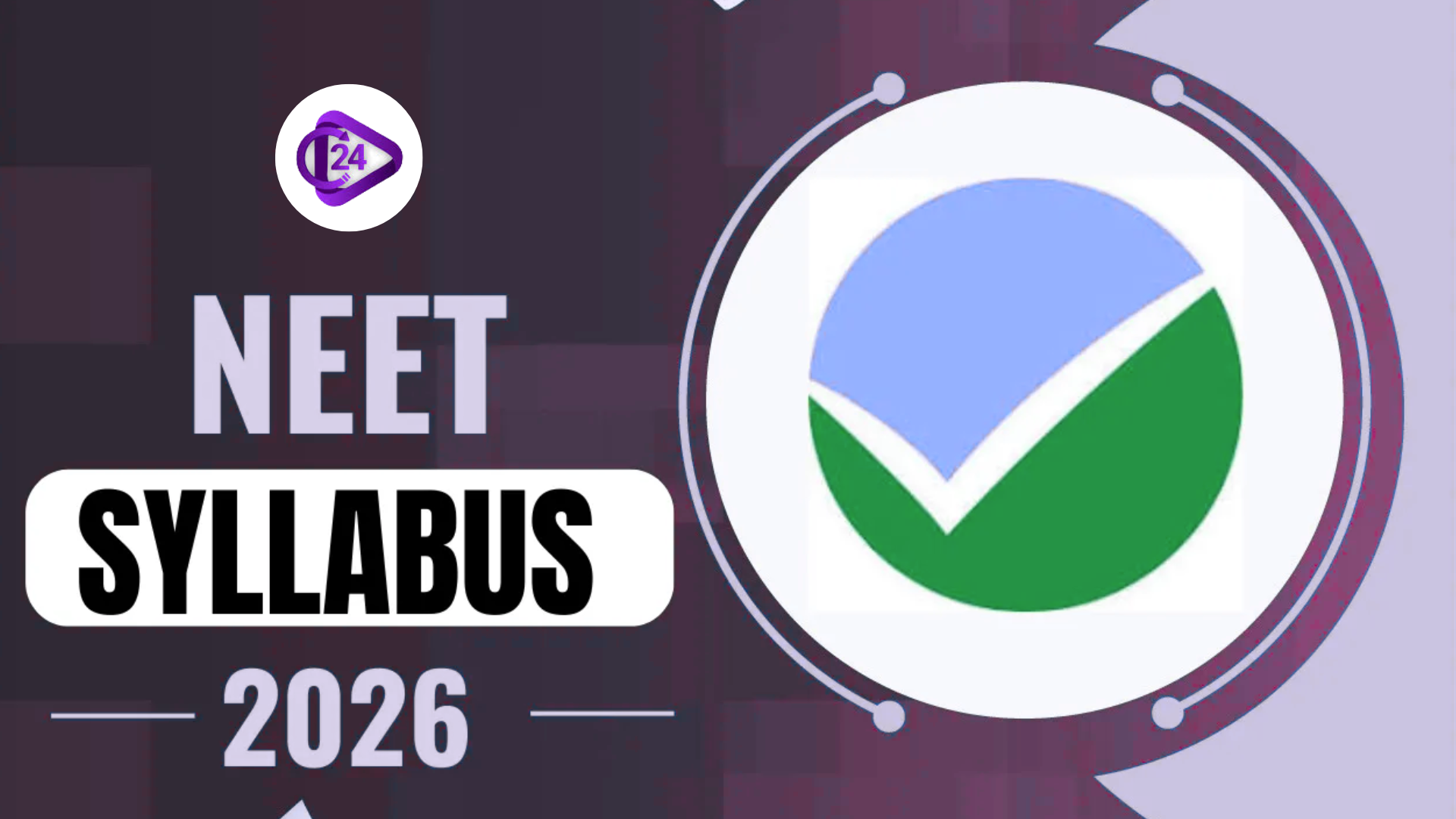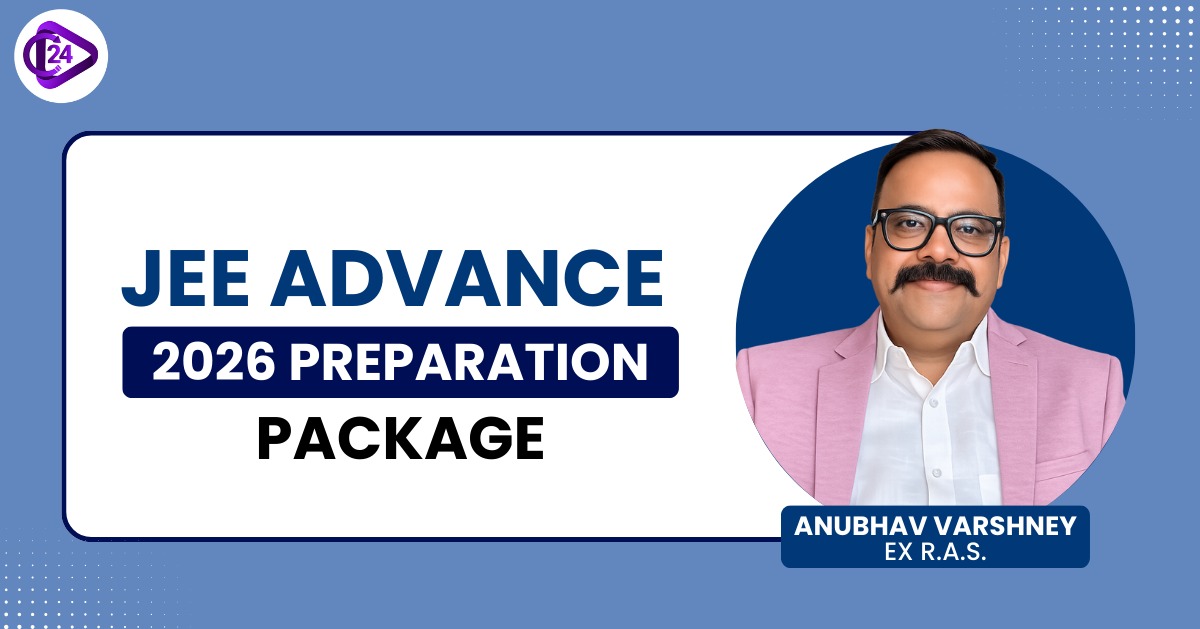Daily Quizzes
Mock Tests
No tests attempted yet.
Select Category
Get in Touch with Class24 for All Your Needs!
The NEET Syllabus 2026 is officially released by the National Medical Commission and remains unchanged from 2025. It is strictly based on the NCERT Class 11 and 12 curriculum for Physics, Chemistry, and Biology. Understanding the syllabus helps aspirants plan smart preparation, focus on high-weightage topics, avoid out-of-syllabus content, and improve accuracy through targeted revision and practice.

The NEET Syllabus 2026 PDF is the most important document for every medical aspirant preparing for NEET UG 2026. Without a clear understanding of the syllabus, even hard work can go in the wrong direction. The syllabus defines what to study, what to skip, and how to plan preparation smartly.
The NEET Syllabus 2026 PDF has been officially released by the National Medical Commission (NMC) and is strictly based on the NCERT Class 11 and Class 12 curriculum. Importantly, the syllabus for NEET 2026 remains unchanged from NEET 2025, which gives students stability and clarity while preparing.
you will find a detailed explanation of the NEET Syllabus 2026 PDF, subject-wise topics, expected weightage, exam pattern, preparation strategy, and important tips for scoring well.
Comparisons with Previous Years
To understand whether the syllabus really got bigger or smaller, here’s the context:
For this year (2026), there’s no change compared with the prior year (2025).
The syllabus covers the same number of chapters and topics that students are already familiar with if they followed the 2025 outline.
That said, there was a broader curriculum rationalization in earlier years when NCERT revised school textbooks and removed some topics. Some coaching platforms and unofficial summaries still discuss those earlier changes. But in the final NEET 2026 syllabus, there’s no formal deletion beyond the established list used in 2025.
Official NEET 2026 Syllabus - Final Status
The syllabus for NEET UG 2026 has been officially released by the National Medical Commission (NMC). It’s based on the Class 11 and 12 curriculum and covers Physics, Chemistry, and Biology.
The key point is:
There are no additions or deletions compared with the NEET UG 2025 syllabus.
The content, chapters, and topics remain the same as last year. The updated document was re-issued, but it did not change the syllabus itself.
Here’s what that means:
- No new chapters or topics added in any subject.
- No topics removed compared with the 2025 syllabus.
- The syllabus aligns strictly with the NCERT Class 11 and 12 textbooks - the same foundation that has guided NEET preparation for years.
So if you’ve already been studying from the official syllabus or NCERT books, there’s no need to overhaul your plan because of new content in 2026.
What is NEET and Why the NEET Syllabus 2026 PDF matter?
NEET (National Eligibility cum Entrance Test) is the only national-level entrance examination to MBBS, BDS, and AYUSH professional programs and BVSc, as well as other undergraduate medical programs in India. Every year lakhs of students appear to take this exam and this makes it very competitive.
The NEET Syllabus 2026 PDF matters because:
- It defines the exact scope of the exam
- It prevents students from studying out-of-syllabus topics
- It helps in creating an effective study plan
- It ensures preparation is NCERT-focused, as required by NMC
Every topper starts preparation by downloading and understanding the NEET Syllabus 2026 PDF.
NEET Syllabus 2026 PDF – Overview
The NEET Syllabus 2026 PDF includes three subjects:
- Physics
- Chemistry
- Biology (Botany + Zoology)
The syllabus is divided into Class 11 and Class 12 topics, and all questions are framed strictly within NCERT guidelines.
NEET Syllabus 2026 PDF – Physics
Physics Syllabus (Class 11 & Class 12)
| Class | Physics Topics |
|---|---|
| Class 11 | Physical World and Measurement |
| Kinematics | |
| Laws of Motion | |
| Work, Energy and Power | |
| Motion of System of Particles and Rigid Body | |
| Gravitation | |
| Properties of Bulk Matter | |
| Thermodynamics | |
| Behaviour of Perfect Gas and Kinetic Theory | |
| Oscillations and Waves | |
| Class 12 | Electrostatics |
| Current Electricity | |
| Magnetic Effects of Current and Magnetism | |
| Electromagnetic Induction and Alternating Currents | |
| Electromagnetic Waves | |
| Optics | |
| Dual Nature of Radiation and Matter | |
| Atoms and Nuclei | |
| Electronic Devices |
Physics Weightage Insight (from NEET trends):
- Mechanics: High
- Electrodynamics: High
- Optics & Modern Physics: Moderate to High
The NEET Syllabus 2026 PDF for Physics requires formula clarity, concept building, and daily practice.
NEET Syllabus 2026 PDF – Chemistry
Chemistry Syllabus (Class 11 & Class 12)
| Branch | Topics / Units |
|---|---|
| Physical Chemistry | Basic concepts, structure of atom, states of matter (gases, liquids, solids), thermodynamics, equilibrium, chemical kinetics, electrochemistry, solutions, surface chemistry |
| Inorganic Chemistry | Periodicity, chemical bonding, coordination compounds, p-block elements, d- & f-block elements, metallurgy, environmental chemistry |
| Organic Chemistry | Basics (carbon, hybridization), hydrocarbons, functional groups (halo, oxygen, nitrogen compounds), biomolecules, polymers, chemistry in everyday life, reactions (addition, substitution, elimination) |
| Practical / Experimental Skills | Titrations, volumetric analysis, qualitative tests, lab preparations, error handling |
The NEET Syllabus 2026 PDF for Chemistry is heavily NCERT-based, especially for Inorganic and Organic sections.
NEET Syllabus 2026 PDF – Biology
Biology is the highest-scoring section and the backbone of NEET preparation.
Biology Syllabus (Class 11 & Class 12)
| Class | Biology Units / Topics |
|---|---|
| Class 11 | Diversity in Living World |
| Structural Organisation in Animals and Plants | |
| Cell Structure and Function | |
| Plant Physiology | |
| Human Physiology | |
| Class 12 | Reproduction |
| Genetics and Evolution | |
| Biology and Human Welfare | |
| Biotechnology and Its Applications | |
| Ecology and Environment |
Nearly all Biology questions come directly from NCERT lines, diagrams, and tables mentioned in the NEET Syllabus 2026 PDF.
High-Weightage Topics (Based on Previous Years)
Subject-wise Important Areas
| Subject | Important Areas |
|---|---|
| Physics | Mechanics, Current Electricity, Modern Physics |
| Chemistry | Chemical Bonding, Coordination Compounds, Thermodynamics |
| Biology | Human Physiology, Genetics, Ecology, Reproduction |
Focusing on these areas within the NEET Syllabus 2026 PDF improves scoring chances.
NEET Exam Pattern 2026
The NEET exam pattern for 2026, to be announced by the National Testing Agency (NTA), will be crucial for candidates preparing for the exam. According to last year's exam pattern, there will be 180 compulsory questions (45 each in Physics and Chemistry and 90 in Biology), which candidates will solve in 180 minutes (3 hours). Candidates are advised to regularly visit the official NTA website, neet.nta.nic.in.
| Subject | Number of Questions | Marks |
|---|---|---|
| Physics | 45 | 180 |
| Chemistry | 45 | 180 |
| Biology | 90 | 360 |
| Total | 180 | 720 |
- Correct Answer: +4 marks for each correct answer.
- Wrong Answer: -1 mark for each wrong answer.
- Unanswered Questions: No marks will be deducted for unanswered questions.
- Multiple Answers: -1 mark for questions with multiple answers.
Biology carries 50% of the total marks, which makes it the most important subject in the NEET Syllabus 2026 PDF.
How to Use This Syllabus Effectively
1. Download & Print the Official PDF
Once NTA publishes it (likely in their Information Bulletin), keep a clean copy to reference.
2. Track Changes / Deleted Topics
Sometimes topics are removed or revised as NCERT updates come in. For example, in recent years, some low-priority topics were removed.
3. Divide Time Across Subjects & Units
Because Biology carries more marks, ensure you devote appropriately more revision time. But don’t neglect Physics & Chemistry.
4. Prioritize High-Weightage Topics
Based on past NEET papers, chapters like Human Physiology, Genetics, Electrostatics, Chemical Bonding, Thermodynamics, etc. tend to carry significant weight.
5. Regular Revision & Practice
After completing each topic, revisit it periodically. Solve previous years’ questions, mock tests, and timed quizzes.
6.Don’t Skip Practical / Experimental Skills
Some questions are derived from experiments, so understanding how things are done (lab work) helps with conceptual clarity.
7.Use NCERT as the Base
Since the syllabus is aligned to NCERT, mastering NCERT content is foundational. Then supplement with reference books / coaching materials for depth.
How to Use NEET Syllabus 2026 PDF for Smart Preparation
Here’s how toppers use the NEET Syllabus 2026 PDF effectively:
- Study only NCERT-based topics
- Mark completed chapters in the syllabus PDF
- Identify weak areas early
- Revise high-weightage chapters multiple times
- Solve previous years’ NEET questions chapter-wise
Common Mistakes Students Make
- Studying beyond the NEET Syllabus 2026 PDF
- Ignoring Class 11 topics
- Skipping revision
- Not practicing mock tests
- Depending too much on reference books
Avoiding these mistakes can significantly improve your rank.
Conclusion
The NEET preparation is based on NEET Syllabus 2026 PDF. The fact that the syllabus is the same also gives the students a golden opportunity to study in a concentrated and stress-free way. The keys to success are strict adherence to NCERT, frequent revision, mock tests and clarity of the concepts.














Your email address will not be published. Required fields are marked *